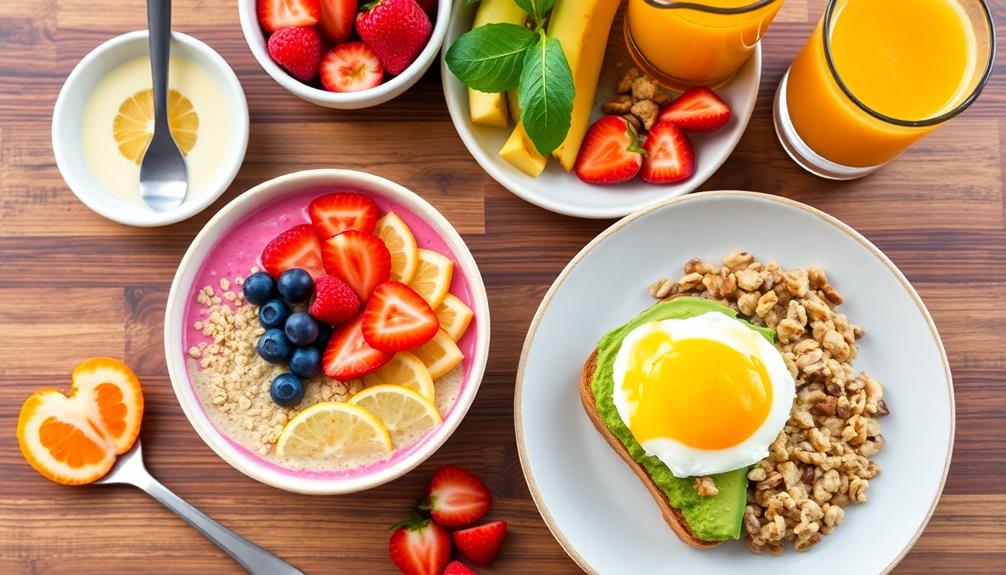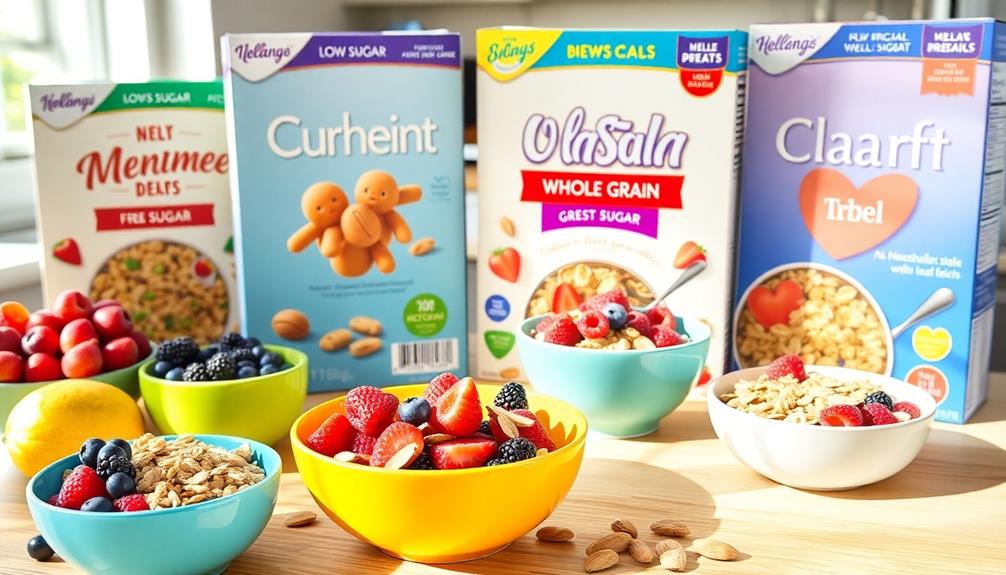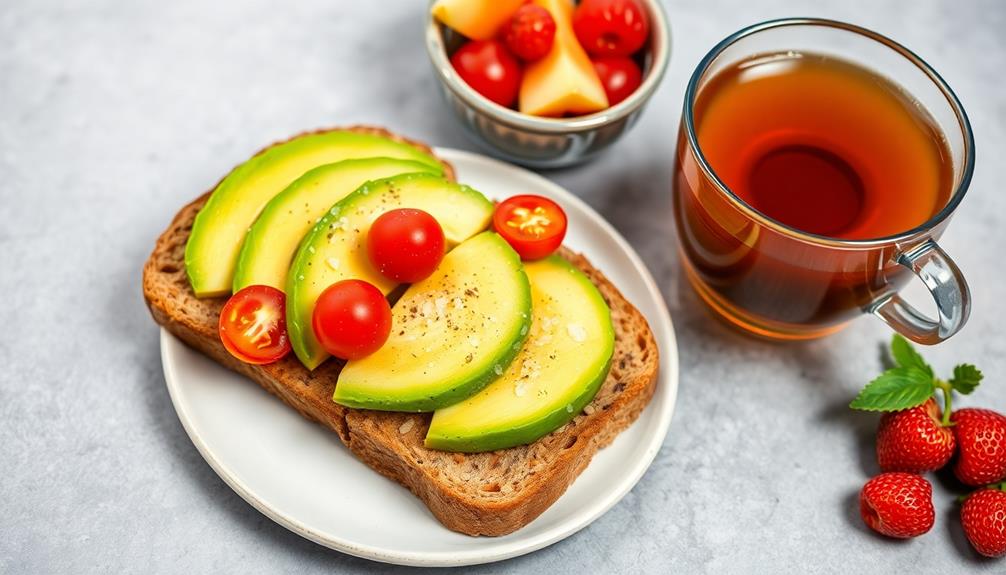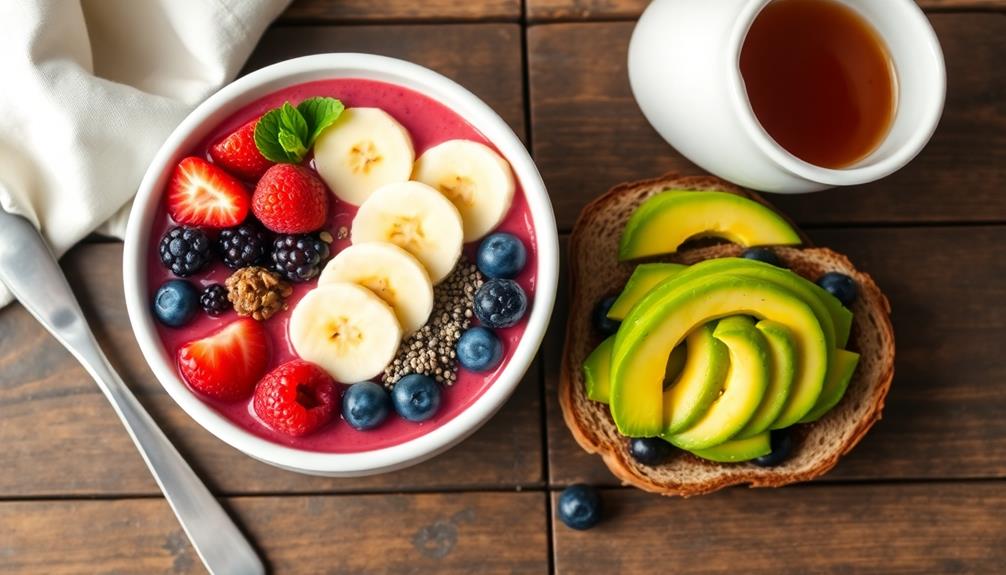A healthy breakfast should range between 300 to 500 calories, depending on your daily intake needs. If you're following a 2,000-calorie diet, aim for about 15-25% of that total. Men typically need around 400-500 calories, while women should target 300-400 calories to start their day right. This calorie range helps stabilize your energy, curbing cravings and preventing overeating. It's important to include a mix of healthy proteins, whole grains, and fats for balanced nutrition. To discover more about crafting your perfect breakfast, you'll want to look into ideal food combinations and portion control. When considering healthy breakfast options, incorporating fruits and vegetables can also provide essential vitamins and minerals to kickstart your day. Some good options include a yogurt parfait with granola and berries, an omelette with spinach and whole grain toast, or oatmeal topped with nuts and banana. By choosing a variety of nutrient-dense foods, you can ensure that you are starting your day off with a well-rounded and satisfying meal. Remember, a healthy breakfast sets the tone for the rest of your day, so it’s worth taking the time to make thoughtful choices.
Key Takeaways
- A healthy breakfast should constitute 15-25% of daily caloric intake, which is 300-500 calories for a 2,000-calorie diet.
- Women should aim for 300-400 calories, while men should target 400-500 calories at breakfast.
- Incorporating protein, healthy fats, and whole grains enhances breakfast's nutritional quality and satiety.
- Larger breakfasts correlate with better dietary habits and lower obesity risk, supporting weight management.
- Breakfast aids in stabilizing energy levels and cognitive function, improving overall health and performance.
Daily Caloric Needs
Understanding your daily caloric needs is vital for maintaining a healthy lifestyle. Your daily calorie needs can vary greatly based on factors like age, sex, size, and activity level. Generally, women require between 1,600 to 2,400 calories, while men need about 2,000 to 3,000 calories.
The average adult's daily caloric intake is around 2,000 to 2,500 calories, which you can adjust based on your goals for weight maintenance, loss, or gain.
To achieve healthy weight loss, consider reducing your daily caloric intake by 500 to 750 calories from your maintenance levels. When planning your meals, keep in mind that a balanced breakfast should make up about 15-25% of your daily caloric intake.
For instance, if your goal is 2,000 calories daily, you should aim for breakfast calories between 300 to 500.
Establishing a daily calorie goal is essential for effective meal planning and achieving your nutritional objectives. By understanding your caloric needs, you can make informed choices about your meals, including how many calories for breakfast, ensuring you fuel your body properly throughout the day.
Importance of Breakfast
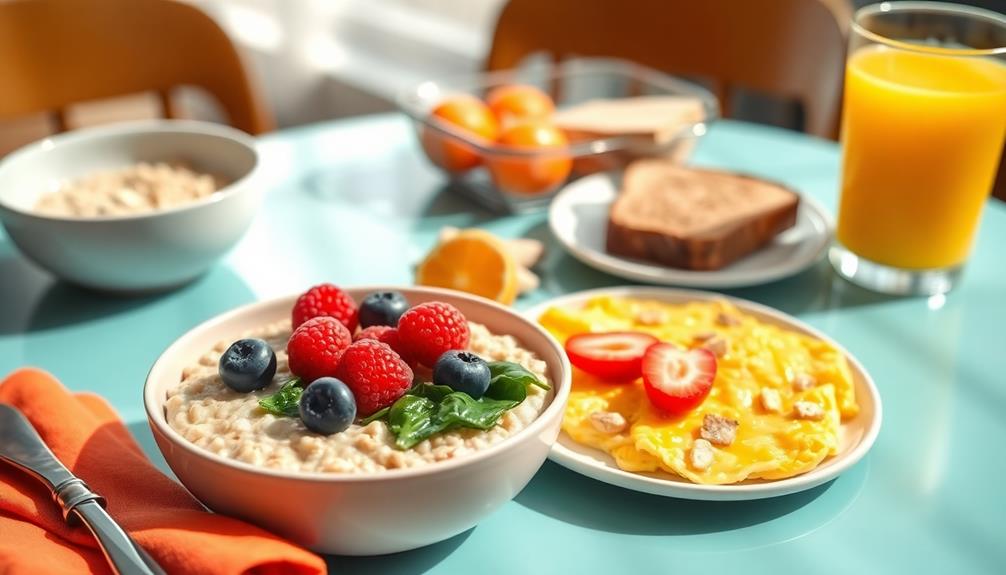
Breakfast plays an essential role in your daily nutrition, influencing both your physical and mental well-being. It's often called the most important meal of the day for good reason.
Regularly eating breakfast can help with weight management by stabilizing your energy intake, preventing excessive hunger later, and reducing the likelihood of overeating. When you skip breakfast, you might reach for unhealthy snacks to satisfy your cravings, which can derail your health goals.
Moreover, a balanced breakfast fuels your body and brain, enhancing cognitive function and concentration throughout the day. Research shows that individuals who eat breakfast tend to perform better academically and at work. It also boosts your metabolism, setting a positive tone for the day ahead.
Incorporating a variety of foods into your breakfast—like whole grains, fruits, and proteins—can support your overall health. This practice not only helps in managing your calorie intake but also lowers the risk of chronic diseases such as diabetes and high blood pressure.
Recommended Caloric Intake

Understanding your daily caloric needs is essential for setting an effective breakfast calorie allocation.
For most people, a well-balanced breakfast should make up 20-25% of your total daily intake, focusing on the right macronutrients.
Daily Caloric Needs
When it comes to daily caloric needs, individuals must consider several factors like age, gender, and activity level. For women, average daily calorie intake ranges from 1,600 to 2,400 calories, while men typically need between 2,000 and 3,000 calories.
To maintain a healthy weight, a balanced breakfast should account for about 15-25% of your total daily caloric needs. This means aiming for 300-500 calories for women and 400-500 calories for men on a 2,000-calorie diet.
Establishing your daily caloric needs is vital for effective meal planning. If you're looking to lose weight, consider a calorie deficit of 500-750 calories per day, which can help you achieve sustainable weight loss.
It's important to focus on ideal diet strategies that incorporate nutritious foods, especially at breakfast, to kickstart your metabolism and provide energy for the day ahead.
Breakfast Calorie Allocation
Allocating the right calories for breakfast is key to fueling your day effectively. Ideally, breakfast should make up about 15-25% of your total daily calories. For most people on a 2,000-calorie diet, that means aiming for 400-500 calories at breakfast.
If you're following a 1,600-calorie diet, targeting around 300 calories is a good approach.
To support ideal weight management and metabolic health, it's beneficial to consume a larger breakfast. Men might aim for 400-500 calories, while women should target 300-400 calories.
Research shows that those who eat a substantial breakfast often enjoy better dietary habits and a lower risk of obesity and chronic diseases.
Macronutrient Balance Importance
Striking the right macronutrient balance at breakfast is essential for optimizing your energy and overall well-being. A well-rounded breakfast should contribute 20-25% of your daily caloric intake, which means aiming for about 300-500 calories if you follow a standard 2,000-calorie diet.
Here's how to balance your macronutrients effectively:
- Include Protein-Rich Foods: Eggs, Greek yogurt, or cottage cheese can help you feel fuller longer.
- Add Healthy Carbohydrates: Whole grains and fruits provide fiber, promoting digestive health and sustained energy.
- Incorporate Healthy Fats: Avocados or nuts can enhance nutrient absorption and stabilize blood sugar levels.
- Stay Mindful of Portions: Balancing these macronutrients guarantees you get the energy you need without overindulging.
Research shows that a breakfast rich in macronutrients supports better cognitive function, mood, and overall dietary patterns.
Ideal Breakfast Composition
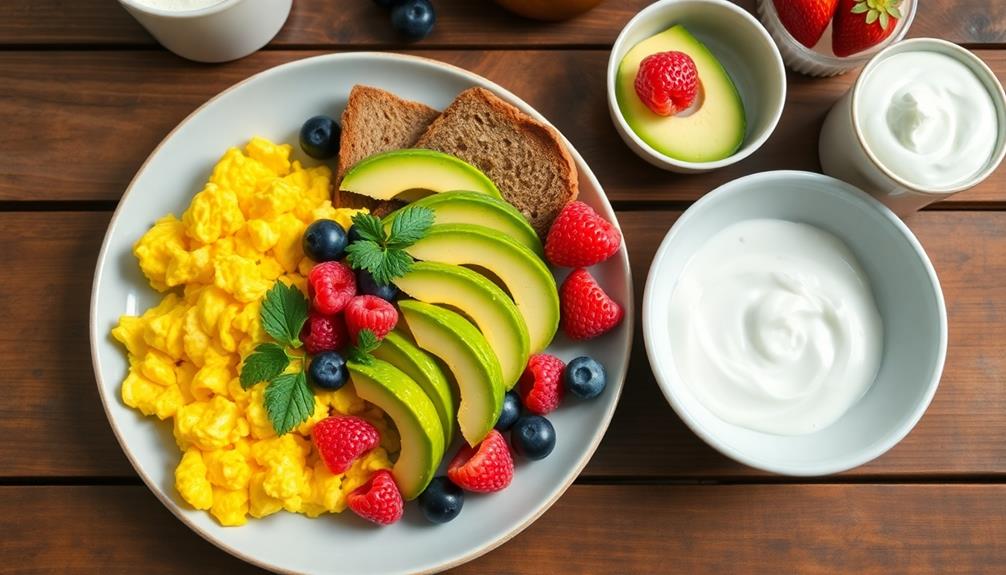
An ideal breakfast composition balances essential macronutrients while staying within a healthy calorie range. For most people on a standard 2,000-calorie diet, this translates to a breakfast of 300-500 calories, making up about 20-25% of your daily caloric needs.
You should aim to include a mix of carbohydrates, protein-rich foods, and healthy fats to enhance satiety and provide lasting energy. Incorporate whole grains, fruits, and vegetables for their fiber content, which aids in digestion and helps you feel full longer. Foods like oats, berries, and spinach are excellent choices.
Protein-rich options like eggs or Greek yogurt not only curb cravings but also support muscle maintenance, making them crucial components of your breakfast. Don't overlook healthy fats, such as those found in avocados or nuts; they contribute to a nutrient-dense meal that fuels you throughout the morning.
Breakfast Calorie Distribution

When it comes to breakfast calorie distribution, hitting the right balance can substantially influence your metabolism and energy levels throughout the day.
Ideally, you should aim for 20-25% of your total daily caloric intake at breakfast. Here's how to break it down:
- Caloric Needs: For a 2,000-calorie diet, target 400-500 calories at breakfast.
- Gender Considerations: Women generally need about 300-400 calories, while men should aim for 400-500.
- Meal Distribution: Distributing calories evenly across meals simplifies meal planning and supports healthy eating habits.
- Metabolism Boost: Studies suggest larger breakfasts can enhance metabolism and promote energy expenditure more effectively than larger dinners.
Common Healthy Breakfast Choices
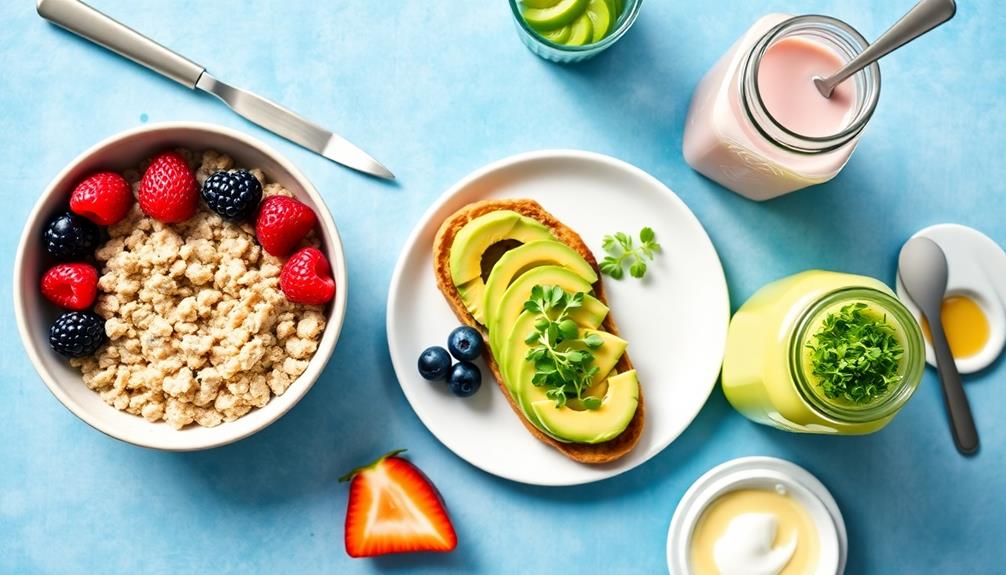
Eating a nutritious breakfast can set a positive tone for your day, fueling your body with the essential nutrients it needs. A healthy breakfast should ideally provide 20-25% of your daily caloric intake, which means aiming for around 300-500 calories. You can achieve this with various delicious options.
Consider oatmeal topped with fruits and nuts, which offers whole grains and fiber. Greek yogurt with berries is another great choice, packed with protein-rich foods that enhance meal satisfaction. Whole-grain toast with avocado or eggs combines healthy fats and protein, all while keeping you within that ideal caloric range.
For a satisfying breakfast without the sugar spikes, opt for unsweetened oatmeal or whole-grain cereals. A classic breakfast of two eggs with whole-grain toast typically falls between 400-450 calories, while a yogurt parfait made with Greek yogurt, berries, and granola usually ranges from 350-400 calories.
With these nutritious breakfast options, you're not just starting your day right; you're also supporting your weight management goals and overall health.
Nutritional Benefits of Breakfast
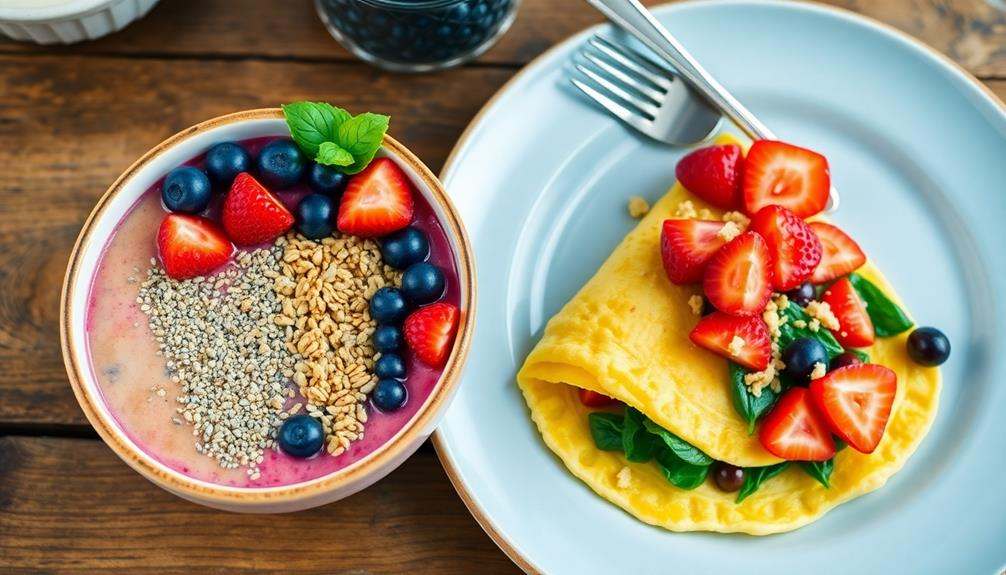
Starting your day with breakfast can greatly impact your overall health and well-being. Not only does it kickstart your metabolism, but it also sets the tone for healthier dietary patterns throughout the day.
Here are some key nutritional benefits of breakfast:
- Caloric Intake: A balanced breakfast makes up about 20-25% of your daily caloric intake, typically ranging from 300-500 calories. This helps manage your overall energy consumption.
- Satiety: Consuming a nutritious breakfast can improve satiety, reducing cravings and preventing overeating later on.
- Stable Blood Sugar: Breakfasts rich in protein, whole grains, and healthy fats help maintain stable blood sugar levels, keeping your energy steady.
- Calorie Burning: Research shows that larger breakfasts promote higher diet-induced thermogenesis (DIT), enhancing calorie burning compared to larger meals later in the day.
Incorporating breakfast into your routine not only fuels your body but also supports cognitive function and lowers the risk of chronic diseases like diabetes and cardiovascular issues.
Prioritize a balanced breakfast to reap these benefits and set yourself up for a successful day!
Impact of Meal Timing
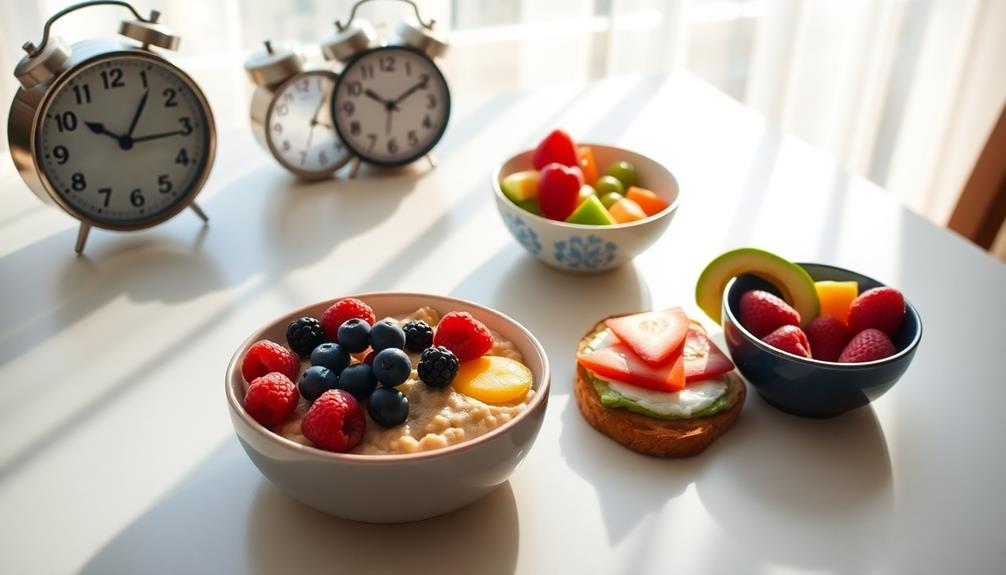
Meal timing plays an essential role in how your body processes food, influencing everything from metabolism to overall health. Consuming a larger portion of your daily calories at breakfast can greatly impact your caloric needs and support weight loss. Research shows that breakfast eaters typically consume 15-25% of their daily caloric intake, which helps promote higher diet-induced thermogenesis (DIT). This means you'll burn more calories throughout the day when you prioritize morning meals over evening ones.
Here's a quick reference table to understand the recommended caloric intake for breakfast:
| Gender | Recommended Breakfast Calories |
|---|---|
| Men | 400-500 calories |
| Women | 300-400 calories |
| Daily Intake | 15-25% of total calories |
| Meal Timing | Morning vs. Evening |
Shifting your caloric intake from the evening to the morning may lead to improved metabolism and a reduced risk of metabolic diseases. By focusing on meal timing, not only can you enhance your diet quality, but you can also support your overall health and well-being. So, consider your breakfast choices carefully!
Strategies for Healthy Breakfasts
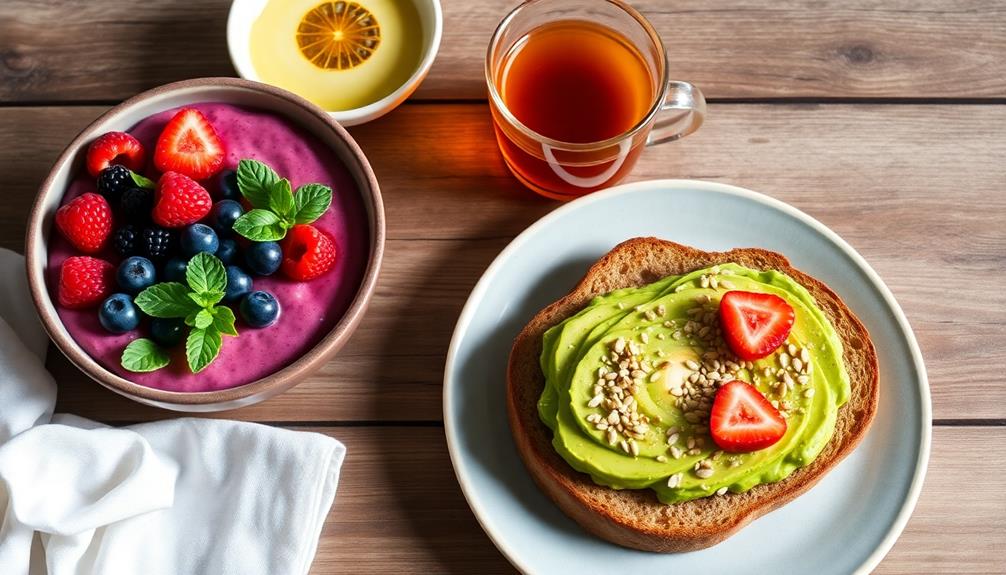
A nutritious breakfast sets the tone for your day, fueling both your body and mind. To optimize your calorie intake and guarantee a healthy start, consider these effective strategies:
- Balance Macronutrients: Aim for a mix of proteins, carbohydrates, and healthy fats. This balance promotes sustained energy and keeps you feeling full longer.
- Choose Nutrient-Dense Foods: Incorporate whole grains, fruits, and protein-rich options like eggs. These selections enhance nutrient density, supporting your overall health and aiding in strategies for weight loss.
- Avoid High-Sugar Cereals: Steer clear of sugary breakfast options. Instead, focus on nutrient-rich alternatives that help stabilize blood sugar levels, reducing cravings later in the day.
- Experiment with Portions: Larger breakfasts can boost thermogenesis, meaning you burn more calories throughout the day. Aim for 300-500 calories to fit within the 20-25% range of your daily caloric intake.
Balancing Daily Caloric Intake
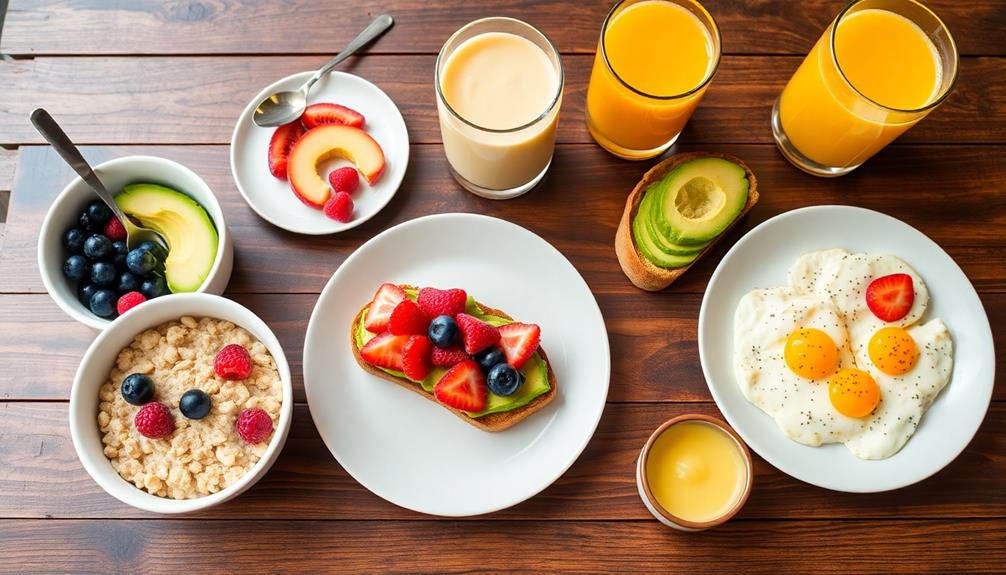
Balancing your daily caloric intake is essential for maintaining energy levels and supporting overall health. Ideally, breakfast should make up about 15-25% of your total daily calories, which means you're looking at 300-500 calories if you follow a 2,000-calorie diet.
Starting your day with a larger breakfast can enhance your metabolism, helping you burn more calories throughout the day due to increased Diet-Induced Thermogenesis (DIT). Incorporating healthy fats, such as those from the keto diet, into your breakfast can provide sustained energy and help manage hunger throughout the morning.
To effectively manage your daily caloric intake, aim to distribute your calories evenly. This typically translates to targeting 500-700 calories for both lunch and dinner.
Research shows that individuals who consume fewer calories in the evening often enjoy better overall diet quality. A well-planned breakfast can play a vital role in managing hunger and reducing cravings, ultimately supporting your weight loss efforts.
Frequently Asked Questions
How Many Calories Should Be in a Healthy Breakfast?
When planning a healthy breakfast, aim for about 15-25% of your daily calories. For most adults, that means targeting 300-500 calories, balancing proteins, healthy fats, and whole grains for sustained energy and satiety.
What Is the Perfect Calorie Breakfast?
When you think about the perfect calorie breakfast, aim for a balanced meal around 300-500 calories. Include proteins, healthy fats, and carbs to fuel your day while keeping you satisfied and energized.
What Should My Calorie Goal Be for Breakfast?
You might wonder if breakfast should be light or hearty. It's best to aim for 300-500 calories, depending on your needs. This balance fuels your day while keeping you satisfied and energized.
What Is a Healthy Breakfast Quantity?
A healthy breakfast quantity varies, but aim for 20-25% of your daily caloric intake. Incorporate a mix of proteins, healthy fats, and carbs to keep you satisfied and energized throughout the morning.
Conclusion
To sum up, a healthy breakfast typically ranges from 300 to 500 calories, acting as the fuel that ignites your day. It sets the stage for balanced energy and nutrient intake, ensuring you're ready to tackle whatever comes your way. By prioritizing a mix of proteins, healthy fats, and whole grains, you're not just feeding your body; you're giving it the nourishment it craves. So, embrace breakfast as your morning ally in achieving your health goals!

